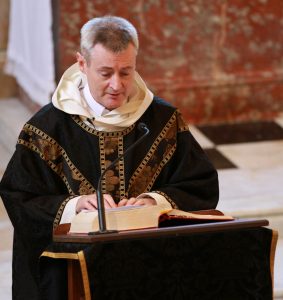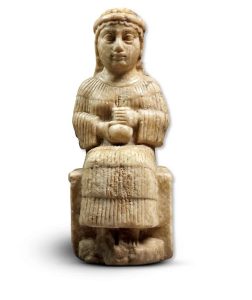When I use the word, “Priest,” what do you envision?
Someone droning in front of a congregation perhaps? At least during the day. At night they blast demons with righteous fury! Or at least that’s how the last campaign went. Darn sneaky Mimics…
What about “Priestess?”
Maybe a group of women in a clearing, chanting at the moon, conducting a solemn ritual handed down over centuries.
The Priest/Priestess archetype has been with us a long time. It presents a surprisingly powerful image. A divine mouthpiece…a person who speaks for a god.

Where Did “The Priest/Priestess” Come From?
Arguably, the concept of a priest predates religion itself. Tribal beliefs, the first proto-religions, largely originated from nature worship.
But nature cannot speak in words like us. Someone has to speak for it.
We don’t exactly know when the first priest or priestess stood up and began to “speak for Nature.” Probably never will. But it was a long time ago.
We know that because we have records of priests among almost all ancient cultures – Egypt, the Sumerians, African tribes, the Phoenicians, etc. A very new thing at the time, culture…but priests were already there.
The word ‘Priest’ is old, and comes from roots older still. It could have come from old Saxon, old high German, or Ancient Greek. The clearest origin terms I could see were, “Elder, Presbyter, venerable.”
“Presbyter”…what’s that?
Its root is “presby-“, again from Greek, meaning, “Before, in front.” Presbyter then, is “One who comes before.”
Now that’s interesting. Comes before what? Or whom?
It’s left open. Which means we don’t know until the priest or priestess tells us. Keep that in mind; it will come up later.
The Middle Ages pivoted away from this open-ended “one who comes before” notion. Before then, a priest could have been a pagan figure, or even a village elder with knowledge of the gods. After then, a ‘priest’ was a Christian/Jewish/Muslim cleric who held a position in a religious organization.
I need to clarify at this point that I don’t judge whether any priest/priestess is ‘better’ than another. Or if they even speak for a god at all. Let’s just say I’ve had enough experiences to be open-minded, but skeptical.
I’m examining this as an Archetype – a concept in human thought, an idea we can use in many contexts, including fiction.

History
We know a number of priests & priestesses from history, both by name and by title. Annals have preserved these individuals well…for varying reasons.
Priests:
- St. Thomas Aquinas, Biblical Scholar
- St. Jerome, Translator of the Christian Bible from Greek into Latin
- Manetho, Priest of Ptolemaic Egypt
- Zhang Daoling, Ancient Priest/First Patriarch of Taoism
- Bartolomé de Las Casas, Spanish missionary
Titles of priests include Wabau (Egyptian), Augur (Roman), Daoshi (Taoist), etc.
Priestesses:
- Pythia, The Oracle of Delphi (I suspect other priestesses took on this title over time, but I haven’t come across their names)
- Aurelia Paulina, Roman Priestess of Artemis
- Himiko of Ancient Japan
- Enheduanna, ancient Akkadian Priestess
Titles of priestesses include Völva (Viking seeress), Hiereiai (Ancient Greek), Druidess (Celtic), etc.

Appearances in Folklore & Fiction
Priests & priestesses abound in both folklore and fiction. Here’s just a few examples.
Folklore:
- Medea, Priestess of Hecate, Jason and the Argonauts
- Prester John – A legendary medieval priest-king of some mythical Christian kingdom. Likely never existed, but he served as a something of an adventurous mystery for centuries.
- Tlachtga, mythical Irish druidess
Fiction:
- Friar Tuck from Robin Hood
- Friar Lawrence from Romeo & Juliet
- Kwai Chang Caine from the Kung Fu series (David Carradine was awesome in those)
Plus, they’re everywhere in gaming, from D&D’s Priest class to Mortal Kombat characters.
The Power in the Priest/Priestess’ Hands
To a large degree, the power held here is determined by the priest/priestess themselves. It’s either the power of Truth or the power of Lies.
The power of Truth comes from speaking for a true and real god.
The power of Lies comes from speaking their own wants, in the guise of a real god.
If we assume the Priest/Priestess does speak for a god, then they hold divine influence over a populace. They serve as mouthpiece for a higher (or lower) power, conveying messages, shaping the course of events…and thereby gaining earthly power in the process.
To question a priest/priestess is to question a god. How dare you?? Blasphemy! Punish them!
If we assume the Priest/Priestess does NOT speak for a god, what power do they hold? Is it the same?
Largely, yes. They can make the same claim, shape events, and even assert the same power.
But there’s a catch. Remember the “one who comes before” meaning? It doesn’t specify ‘before what’…never did. Still doesn’t.
Which means that a priest/priestess can’t completely prove their claim. You lowly unwashed masses have to take it on faith. Because you are not a priest/priestess, and therefore you can’t prove they’re lying. How dare you??
Essentially, we have an unprovable power via speech & action. Is the Priest/Priestess a mouthpiece or not? Is it ego talking, humility, or something else entirely? Therein lies the conundrum…and historically, their power over others.

How to Think About Priests/Priestesses Today
In philosophical terms, a Priest/Priestess can provide insight, counsel, and even aid. Depending on the god they serve, the aid could come in the form of medicine, literature, blessing, or magic.
You just have to examine their authenticity. Make sure you’re confident they speak the Truth, and not a self-serving Lie.
In fiction, Priests/Priestesses serve well to introduce the trappings of religion into a story. (Notice I didn’t say it had to be a good religion…)
This can help provide motivation to characters (for good or ill), generate or expand conflict, and exert a degree of control over the plot.
Religion is a powerful influence on human thought. Those who can wield that influence, therefore, can change the course of whole societies.
The question is…in whose name do they do it?
Sources:
